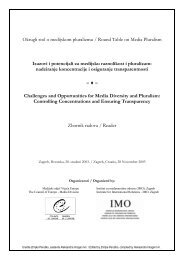almanac on security sector oversight in the Western Balkans
almanac on security sector oversight in the Western Balkans
almanac on security sector oversight in the Western Balkans
Create successful ePaper yourself
Turn your PDF publications into a flip-book with our unique Google optimized e-Paper software.
M<strong>on</strong>tenegro<br />
F<strong>in</strong>ally, <strong>the</strong> Nati<strong>on</strong>al Security Agency is, accord<strong>in</strong>g to relevant legislati<strong>on</strong>, <strong>the</strong> civilian<br />
<strong>in</strong>telligence and counter-<strong>in</strong>telligence service designed to protect <strong>the</strong> nati<strong>on</strong>al <strong>in</strong>terests<br />
of <strong>the</strong> country. (Law <strong>on</strong> Nati<strong>on</strong>al Security Agency (2005), Art.1) The law prescribes that<br />
<strong>the</strong> Nati<strong>on</strong>al Security Agency is under democratic civilian c<strong>on</strong>trol.<br />
The present analysis was unable to po<strong>in</strong>t out <strong>the</strong> key issues or debates that have<br />
framed <strong>security</strong> <strong>sector</strong> reform and governance <strong>in</strong> M<strong>on</strong>tenegro. One reas<strong>on</strong> for this<br />
alluded to previously is a highly dis<strong>in</strong>terested public that is reluctant to take an active<br />
role <strong>in</strong> giv<strong>in</strong>g <strong>the</strong>se issues visibility. This could be perceived as <strong>the</strong> result of broader<br />
c<strong>on</strong>textual factors with<strong>in</strong> which <strong>security</strong> <strong>sector</strong> reform <strong>in</strong> M<strong>on</strong>tenegro has unfolded,<br />
menti<strong>on</strong>ed previously. In additi<strong>on</strong>, <strong>the</strong> government followed a top down approach<br />
when reform<strong>in</strong>g <strong>the</strong> <strong>security</strong> <strong>sector</strong> and it did not <strong>in</strong>clude o<strong>the</strong>r actors <strong>in</strong> discussi<strong>on</strong>s<br />
about <strong>the</strong> reform. Although not essential for <strong>security</strong> <strong>sector</strong> reform, <strong>the</strong> fact that <strong>the</strong><br />
government never clearly def<strong>in</strong>ed its goals for reform or proposed a coherent acti<strong>on</strong><br />
plan had deleterious results. The government did not specify by which means it<br />
planned to achieve <strong>the</strong> aims of <strong>the</strong> reform nor did it provide a cost benefit analysis of<br />
<strong>the</strong> reform or a prognosis of how l<strong>on</strong>g it would last. To put it simply, <strong>the</strong> country never<br />
made a detailed needs analysis as set out above – “<strong>the</strong> plan of state reform” (Hadzic,<br />
2009) before embark<strong>in</strong>g <strong>on</strong> reform. Without a clear plan and guidel<strong>in</strong>es, it was unlikely<br />
for serious debates around <strong>the</strong> <strong>security</strong> <strong>sector</strong> to occur. Notwithstand<strong>in</strong>g <strong>the</strong> lack<br />
of <strong>in</strong>terest from civil society and <strong>in</strong>sufficient expertise <strong>in</strong> this area, eventually, all of<br />
<strong>the</strong>se factors meant that M<strong>on</strong>tenegro (<strong>in</strong>clud<strong>in</strong>g parliament) has never had a serious<br />
debate regard<strong>in</strong>g <strong>the</strong> structure, pace and costs of <strong>security</strong> <strong>sector</strong> reform.<br />
The European and Euro-Atlantic <strong>in</strong>tegrati<strong>on</strong> process (<strong>the</strong> aim to become member of<br />
<strong>the</strong> EU and NATO) and efforts to br<strong>in</strong>g <strong>security</strong> <strong>sector</strong> legislati<strong>on</strong> <strong>in</strong> l<strong>in</strong>e with <strong>in</strong>ternati<strong>on</strong>al<br />
standards helped to advance reform. The specific local c<strong>on</strong>text of <strong>the</strong> country,<br />
however, must not be neglected. Unfortunately, <strong>in</strong> practice, this mistake was made. As<br />
was <strong>the</strong> case <strong>in</strong> a number of post-communist countries, M<strong>on</strong>tenegro mostly has adopted<br />
legal standards of <strong>Western</strong> countries without sufficiently tak<strong>in</strong>g <strong>in</strong>to account <strong>the</strong><br />
local c<strong>on</strong>text and <strong>security</strong> needs. As a result, <strong>the</strong>se laws are c<strong>on</strong>stantly be<strong>in</strong>g changed<br />
and amended. This is a serious burden <strong>on</strong> state resources, both human and material.<br />
For <strong>in</strong>stance, when it comes to <strong>the</strong> ma<strong>in</strong> strategic documents of <strong>the</strong> state, such as <strong>the</strong><br />
Nati<strong>on</strong>al Security Strategy, <strong>the</strong> desire to fulfil all <strong>the</strong> necessary c<strong>on</strong>diti<strong>on</strong>s <strong>in</strong> regard to<br />
accessi<strong>on</strong> to <strong>the</strong> NATO Alliance are evident, whereas needs and challenges emanat<strong>in</strong>g<br />
from <strong>the</strong> nati<strong>on</strong>al c<strong>on</strong>text are hardly taken <strong>in</strong>to account. The Nati<strong>on</strong>al Security<br />
Strategy is an important document with <strong>the</strong> ma<strong>in</strong> purpose be<strong>in</strong>g to def<strong>in</strong>e potential<br />
<strong>security</strong> challenges, risks and threats. Instead of <strong>in</strong>clud<strong>in</strong>g challenges that are specific<br />
to M<strong>on</strong>tenegro and <strong>the</strong> <strong>Western</strong> Balkan regi<strong>on</strong>, however, certa<strong>in</strong> def<strong>in</strong>iti<strong>on</strong>s were<br />
simply copied from NATO strategic documents. Regi<strong>on</strong>s such as <strong>the</strong> Middle East and<br />
<strong>the</strong> Caucasus, which are major NATO priorities but not necessarily M<strong>on</strong>tenegr<strong>in</strong> priorities,<br />
have been <strong>in</strong>cluded <strong>in</strong> <strong>the</strong> strategy. The Nati<strong>on</strong>al Security Strategy also claims that<br />
organised crime <strong>in</strong> M<strong>on</strong>tenegro is solely an external threat. This aga<strong>in</strong> ignores <strong>the</strong> domestic<br />
c<strong>on</strong>text, because it excludes <strong>the</strong> possibility that organised crime may orig<strong>in</strong>ate<br />
and/or be present <strong>in</strong> <strong>the</strong> country. This is simply not <strong>in</strong> accordance with numerous reports<br />
from <strong>in</strong>ternati<strong>on</strong>al and domestic organisati<strong>on</strong>s. Also, <strong>the</strong> European Uni<strong>on</strong>, <strong>in</strong> its<br />
165<br />
Almanac <strong>on</strong> Security Sector Oversight <strong>in</strong> <strong>the</strong> <strong>Western</strong> <strong>Balkans</strong>



